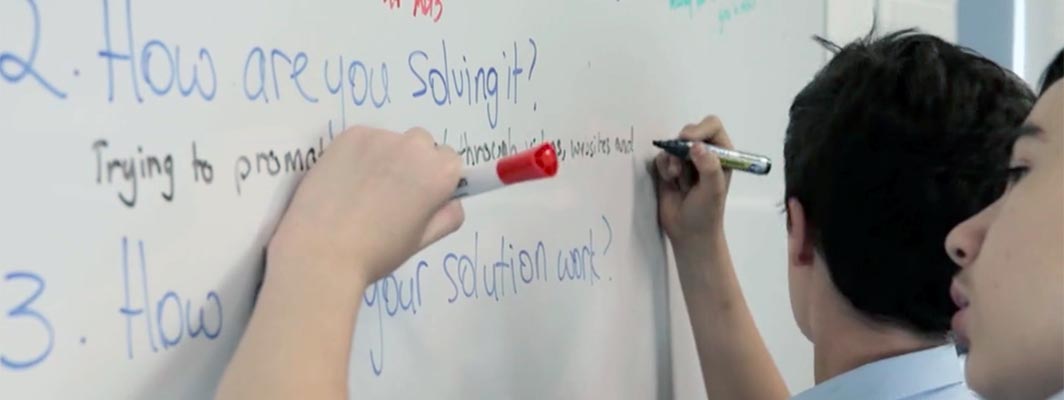
January 24, 2019 | By Stefani Pautz Stephenson, Josh Weisgrau and Elyse Gainor
Powerful learning must be inquisitive and reflective. Inquiry and reflection are strategies for engagement as well as for enduring learning. They are also critical skills for students’ futures. Today’s students must be able not only to attain new knowledge, but to also ask questions that lead to new insights. Reflecting on newly developed and prior knowledge allows us to deepen understanding of what and how they have learned. Teachers who make inquiry and reflection a regular part of instructional practice ensure that students are attending to the learning, strengthening memory, and building skills for their future.
When learning is driven by asking questions and seeking both answers and new questions in response, it shows students that knowledge and growth, not memorization and recall, are their goals. Guiding questions can help students define a topic, create meaning from new information, and make connections between their learning and their world. “If young people can develop a sense of deep understanding through inquiry-based teaching and learning, then they will not only possess the knowledge they have developed, but will be able to perform their understanding of a particular topic,” explains researcher Edward Clapp of Harvard’s Project Zero.
Inquiry also supports culturally responsive teaching practices. When students have autonomy in asking guiding questions as part of their learning, inquiry can be empowering, as learners have agency to develop understanding of the world around them. Making inquiry collaborative, where students work together to ask questions, seek answers, and make connections, amplifies student engagement and deeper learning.
Learning sciences research shows that the ways in which reflection is designed, including when it is practiced, can support memory. Retrieval practice, in which students recall learning from long-term memory, makes learning more enduring by improving memory. Teachers can provide opportunities for students to recall information from previous learning either to support connections to new learning or as an opportunity for formative assessment. Spacing learning and recall out over time also supports enduring learning and improves memory. When students recall and reflect on prior concepts to synthesize new ideas, learning is deeper and longer lasting.
Equally important to the recall of learning content is reflection to enable meaning-making from learning. Educators must deliberately create space for reflection that is separate from activities of information gathering and knowledge construction. Researcher Mary Helen Immordino-Yang suggests that, “Simple reflection strategies like Project Zero’s ‘I used to think … Now I think …’ help kids become more aware of their own knowledge structures and how to explicitly rework their beliefs.” While reflection may feel like a pause from the activities we usually envision as learning, it is vitally important, and just a few minutes a week can offer students the opportunity to reflect on their learning and learning process to deepen their understanding of themselves and their world.
Taking time for reflection is equally important for educators, as reflecting on practice is key to continuous improvement. Micro-credentials can impact educator practice by providing a self-paced professional learning experience that fosters inquiry into and reflection on teacher practice. Educator Tiffany Correa explained how micro-credentials were a Powerful Learning experience for her: “I found myself becoming more reflective as a professional and realized that creative learning and great lessons take time. Just like we tell our students not to rush through their work, we often do not practice what we preach as professionals.”
Challenge Based Learning (CBL) provides a framework for authentic student learning driven by guiding questions. For a model of a CBL project, check out the Reduce Your Carbon Footprint Challenge. Teachers are provided with sample guiding questions as well as a resource for designing questions. Students can co-construct and prioritize the inquiry questions with teachers.
Use the learning environment to create a dedicated space for reflection, and help students establish reflection as a natural part of their learning process, as students at the Arizona School for the Arts did by creating Project Booth.
Ready for more? Use these resources to support your design of authentic and challenging learning experiences:
If you are an educator creating powerful learning experiences for your students that are inquisitive and reflective, consider earning some of these educator micro-credentials to be recognized for and share your accomplishments:
Follow us for the latest on Powerful Learning and use our resources to implement powerful learning in your teaching and learning practice.
Blog updated in September 2020.
Citations
By Dr. Kyle Dunbar and Katie Wilczak
By Elliott Barnes and Sara Mungall